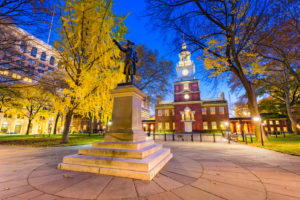For legal professionals in Philadelphia that are seeking the fresh challenge of a career move, the Legal Recruiter Directory may provide the answer to your employment opportunity search needs. With contacts at local law firms and corporations seeking legal counsel, legal staffing firms are often the first to know about the legal hiring needs at employers across the city.
Alongside their inside knowledge of hiring practices and available positions at local law firms, Philadelphia legal recruitment agencies can conduct a discreet job search process on your behalf that will retain your privacy and reputation in the legal community.
Verified Philadelphia Area Legal Recruiters
Need Help Finding a Recruiter?
Job Opportunities
 As the economic and cultural hub for the 7.2 million people living in the Delaware Valley Philadelphia, or “Philly” for short, is the 6th most populous city in the U.S. With a rich history dating back to America’s founding this bustling city is known for its passionate sports fans and blue-collar work ethic. Philadelphia’s affordable cost of living and proximity to the corporate headquarters of 16 Fortune 500 companies makes it a great place to practice for talented lawyers seeking fresh career challenges.
As the economic and cultural hub for the 7.2 million people living in the Delaware Valley Philadelphia, or “Philly” for short, is the 6th most populous city in the U.S. With a rich history dating back to America’s founding this bustling city is known for its passionate sports fans and blue-collar work ethic. Philadelphia’s affordable cost of living and proximity to the corporate headquarters of 16 Fortune 500 companies makes it a great place to practice for talented lawyers seeking fresh career challenges.
Over 21,000 lawyers currently practice in the greater Philadelphia area, many of whom do so at its 1800+ law firms and plethora of government agencies. The average attorney earns a base salary of $102,479 while enjoying career enrichment opportunities through these professional organizations:
- Pennsylvania Bar Association
- Philadelphia Bar Association
- 3 ABA-accredited law schools
- Various other state and local bar associations based on practice specialty, ethnicity, gender, sexual orientation, race and other membership criteria
Requirements to Practice Law
Candidates who have earned a J.D. from an ABA-accredited law school may apply to take the Pennsylvania Bar Exam (PBE), along with any foreign law school graduate who meets specific requirements. In addition to passing the PBE, all applicants must also pass the Multistate Professional Responsibility Exam (MPRE). Pennsylvania does have reciprocity agreements with most U.S. jurisdictions and will allow attorneys who have been practicing in those jurisdictions for 5 of the past 7 years to take the PBE and apply for the state Bar once they pass.
After an attorney has been sworn into the Pennsylvania Bar, to maintain their license they must complete 12 hours of CLE each year, including one hour in professional ethics. For more information about practicing law in Pennsylvania visit: www.lawyeredu.org.
Why Philadelphia?
Philadelphia’s downtown area is a unique blend of high rises, historic architecture and ethnic restaurants. The city is famous for its vibrant nightlife, numerous museums and performing arts venues. Fortune 500 companies like Comcast, Aramark, Lincoln National and Amerisource Bergen, along with dozens of colleges and universities, drive the city’s global economy in sectors like oil refining, higher education, manufacturing, healthcare, financial services and telecommunications.
Philadelphia’s cost of living runs slightly higher than the national average due to transportation and grocery costs, but housing prices are very affordable. Residents can take advantage of the bus, light rail and trolley services provided by the Southeastern Pennsylvania Transportation Authority (SEPTA), or travel by plane through Philadelphia International Airport. Philly’s Legal District is located downtown just south of I-676 and some of its best neighborhoods include Bustleton, City Center, Chestnut Hill, Manayunk and Wharton-Hawthorne-Bella Vista.
In addition to its numerous parks and bike trails, some of the major attractions in Philadelphia are The Franklin Institute, Reading Terminal Market, Old City Area, Museum of Art, Liberty Bell Center and 5 major league sports franchises. The area’s 4-season climate produces a slightly above average amount of rainfall each year and slightly below average amounts of snow. July is usually the warmest month, with average daily highs near 90 degrees F, and January serves as the coldest month, with average lows hovering near 26 degrees F.
The Legal Recruiter Directory Contains Contact Information for the Best Legal Recruiters in Philadelphia
When you choose to involve a Philadelphia legal recruiter in the job search process you can work smarter, not harder to find ideal roles, firms and specialty practice areas suited to your expertise. Communication between you, the legal recruitment firm, and any potential Philadelphia-based law firm or corporate legal counsel employer is kept minimal and discrete. Legal placement firms work as your advocate during the entire screening, interview, and hiring process to alleviate any concerns that you might have as your career takes on a new focus.
All the information on this website is published in good faith and for general information purpose only. The Legal Recruiter Directory does not make any warranties about the completeness, reliability and accuracy of the information found on this website or that of the linked sites.
